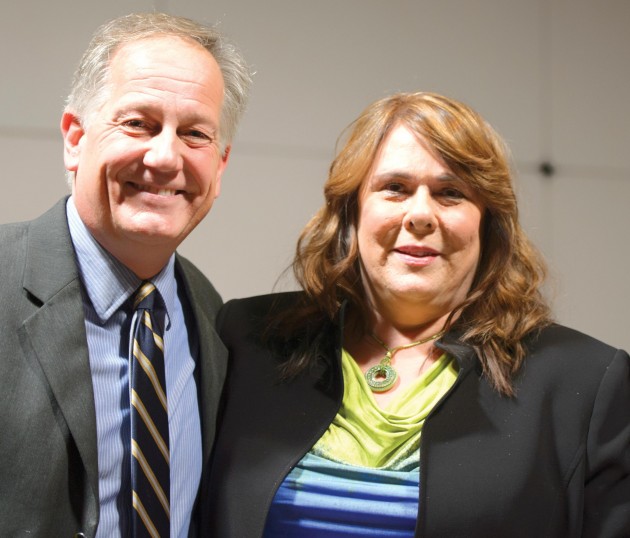
Ken Owen '82, director of media relations at DePauw, was away from a television studio for 10 years before he moderated the third and final debate in the race for Indiana's governor last Thursday.
"I wasn't nervous," Owen said. "But there is a certain level of anxiety that happens when you revisit something that you haven't done for awhile."
To regain some his confidence before the the cameras started rolling the debate between Democrat John Gregg, Republican Mike Pence and Libertarian - and former Survivor contestant - Rupert Boneham, Owen took advice from CNN correspondent Candy Crowley, who spoke on campus last month as part of this year's Ubben Lecture series.
"[Crowley] said, 'you're a pro,' Owen. 'Take a deep breath, do it, and you're going to be fine,'" Owen said.
When Crowley visited for her Ubben Lecture last month, just three weeks before she moderated a nationally-televised presidential debate, the two talked about their upcoming jobs.
However, despite his slight anxiety, Owen is no stranger to television. Before he became a DePauw spokesman in 2001, Owen moderated an Indianapolis mayoral debate in 1999, and spent over 10 years in the television industry, first as a television news anchor in Fort Wayne and later in Ashville, N.C. Crowley reassured Owen of his abilities, reminding him of his experience in the media industry.
In contrast to Candy Crowley, who was responsible for coming up with her own questions for the presidential debate, Owens solely presented questions submitted by voters to the three candidates.
Christopher Wells, vice president for Communications and Strategic Initiatives said Owen was a suitable choice as moderator for this particular debate.
"I think he's appropriately non-partisan - the debates are meant to inform," Wells said. "People ought to come out of it with more information, it's not that their dispositions ought to change."
The debate, which lasted an hour, covered issues like the Indiana budget, creating new jobs in state and the auto industry.
Before the debate began, emotions were running high backstage.
"The candidates have to be kept apart," Owen said. "There's definitely some tension between them. When you get them together it's fine, but the protocol of getting them together makes them uncomfortable."
The debate became fairly heated when Gregg accused Pence, who is leading in the Indiana gubernatorial polls, of being a Tea Party extremist and a supporter of Indiana's senatorial candidate Richard Mourdock. Mourdock, also a Republican, recently made a controversial statement that a pregnancy resulting from rape is "God's will."
Gregg referred to voting for Pence as a vote for the "Pence/Mourdock ticket." Pence countered that he disagreed with the comment that Mourdock made.
Owen said Gregg was on the offensive that evening, making Pence uncomfortable, and Pence was becoming "agitated when Gregg spoke."
Despite Owen's mild nervousness about the debate, he said he received a lot of positive feedback. Jonathan Coffin, assistant to President Brian Casey and director of strategic communications, said Owen's participation in state politics is something that the university can be proud of.
"It's very neat for DePauw, and definitely a testament to Ken," Coffin said.
Owen said that he was also flooded with emails and messages on Facebook.
Even with a successful debate behind him, Owen says that he will not be returning to television anytime soon, even after hearing positive feedback from Indianapolis news anchor John Stehr.
"[He] sent me a message and asked, 'why aren't you on TV anymore?'" Owen said, "I love my job at DePauw, but it still meant a lot to me to hear someone say, 'hey, you can still do it.'"


